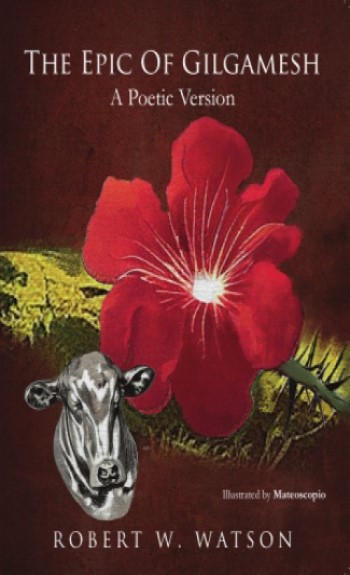Book Reviewed by Michaela Gordoni
The Epic of Gilgamesh is popularly considered to be the oldest piece of written literature ever discovered. Robert W. Watson’s The Epic of Gilgamesh: A Poetic Version sets out to recount the story of the great King Gilgamesh in poetic verse across 120 pages. The timeless tale starts when a boy sees Enkidu, a strange beast, in the woods. He alerts the King, who sends a woman to bring out the beast-man’s humanity with a kiss. Upon turning into a much more human-like version of himself, he becomes enraged when he hears about the King’s unjust marriage plans. He starts a riot, and the King is the object of his fury. But somehow, the two stop their fighting and realize that they are one and the same, and a fierce and deep friendship ensues between the two. Together, Enkidu and King Gilgamesh embark on a monster-hunting quest, which eventually turns into a venture seeking eternal life. Purchase Here.
Watson’s poetic retelling of the Epic of Gilgamesh serves as an excellent introduction to this ancient epic. Though Robert W. Watson has taken a good dose of poetic liberty, it does not bear great significance in a recounting of this sort. The format is easy enough to understand and, for the most part, sounds pleasant when read aloud. Though there are a few instances where the key rhyming words are awkwardly placed, when reading aloud, the orator has to be aware of these and read carefully in order for the text to sound right and flow smoothly. Yet shaping the ancient story into a rhyme is a big task, and Robert W. Watson has still done very well, considering.
Robert W. Watson has also thoughtfully included pictures to go with sections of the epic. At first, the images seem slightly rudimentary and lack a bit of detail, but on further inspection, they seem to be in step with the kind of art that is often found in versions of the Bible. It seems like it is likely intentional, meant to be a subtle correlation to the time of the Old Testament. It suggests that the illustrations are intentionally designed to evoke a sense of time immemorial and align with the context of the ancient tale.
Overall, Robert W. Watson’s The Epic of Gilgamesh: A Poetic Version is a great way for readers of any age to learn about this ancient story of quests and friendship. Despite the occasional poetic liberties and minor issues with rhyming, Watson’s retelling captures the spirit of Gilgamesh’s epic journey. With its accessible format and accompanying illustrations, the book serves as a compelling entry point into the world of ancient literature, allowing readers to appreciate the enduring themes and engaging narrative of the Epic of Gilgamesh.
